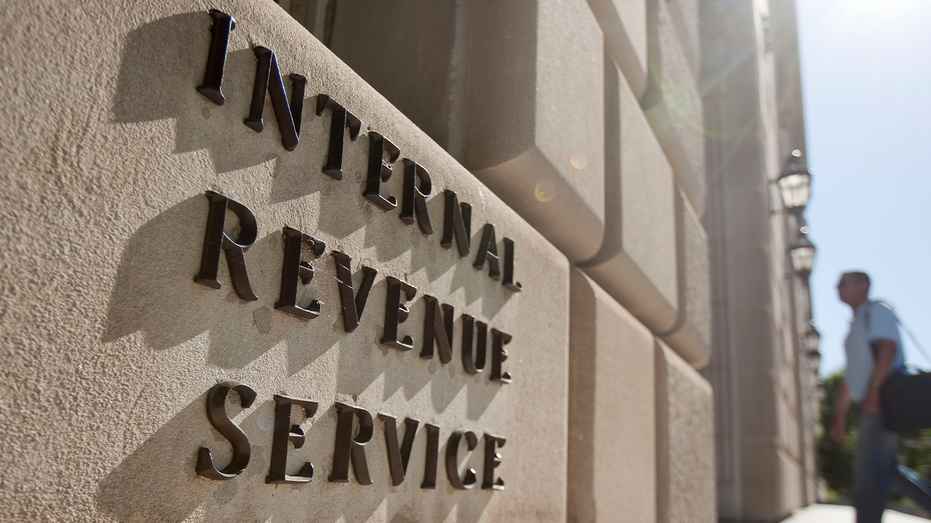How will Democrats' pared-back IRS bank-monitoring plan work?
Banks would be forced to turnover more bank account information to IRS
IRS bank reporting proposal 'contradicts' basic US principles: Hoenig
Mercatus Center Distinguished Senior Fellow Thomas Hoenig discusses Biden pushing his economic agenda amid rising inflation and the Democrats raising proposed IRS bank reporting threshold to $10,000.
The Biden administration this week endorsed a narrower version of its deeply controversial plan that would force banks to turn over more account information to the Internal Revenue Service in order to crackdown on tax cheats.
Under the new plan that Senate Democrats unveiled Tuesday, banks, credit unions and other financial institutions would be required to report annually on accounts with deposits and withdrawals worth more than $10,000, rather than the $600 threshold that President Biden initially proposed.
The Treasury Department is proposing two new data points – how much money went into the account over the course of the year, and how much came out – to an existing tax form that banks used to report other information to the IRS.

Federal Reserve Chair Janet Yellen removes her glasses as she testifies on Capitol Hill in Washington, Wednesday, July 12, 2017, before the House Financial Services Committee to give the semiannual monetary policy report to the Congress. (AP Photo/Ja (AP Newsroom)
"Today’s new proposal reflects the administration’s strong belief that we should zero in on those at the top of the income scale who don’t pay the taxes they owe, while protecting American workers by setting the bank account threshold at $10,000 and providing an exemption for wage earners like teachers and firefighters," Treasury Secretary Janet Yellen said in a statement.
WEALTHY AMERICANS SHIELD 20% OF THEIR INCOME FROM THE IRS
The tightening of the plan follows a steady lobbying campaign from banking groups and other industry organizations, in addition to fierce pushback from Republican lawmakers who amounted it to the worst type of government overreach.
Even with the slimmer scope, however, banks and other industry groups have argued the policy presents potential financial privacy risks for customers while increasing compliance costs for banks and adding to the already existing burden the industry faces in turning over information to the government.
"Even with the modifications announced today, this proposal still goes too far by forcing financial institutions to share with the IRS private financial data from millions of customers not suspected of cheating on their taxes," Rob Nichols, president and CEO of the American Bankers Association, said in a statement.
He added: "If enacted, this new proposal would still raise the same privacy concerns, increase tax preparation costs for individuals and small businesses, and create significant operational challenges, particularly for community banks," he added.
The White House has repeatedly defended the plan, writing in a memo to congressional Democrats that requiring banks and financial institutions to provide a "little bit of high-level information" to the IRS on account flows gives the agency more information about wealthy Americans' earnings from investments and business activity.
IRS CHIEF TELLS WARREN ADDITIONAL FUNDING NEEDED TO CRACK DOWN ON TAX CHEATS
Recipients of federal benefits like unemployment and Social Security would be exempt from the policy, which would also exclude any income received through a paycheck in which federal taxes are automatically deducted. The proposal will also exempt large purchases, like a down payment for a house, according to Senate Finance Chair Ron Wyden, D-Ore.

A man enters the Internal Revenue Service (IRS) building in Washington, D.C., U.S., on Friday, May 7, 2010. (Andrew Harrer/Bloomberg via Getty Images) (Andrew Harrer/Bloomberg / Getty Images)
The Treasury Department said this carve-out is designed to ensure that "that only those accruing other forms of income in opaque ways are a part of the reporting regime."
"This is a well-reasoned modification: for American workers and retirees, the IRS already has information on wage and salary income and the federal benefits they receive," a treasury fact sheet on the changes said.
Banks are already required to report any transaction that exceeds $10,000 to the Financial Crimes Enforcement Network – part of anti-money laundering requirements.
GET FOX BUSINESS ON THE GO BY CLICKING HERE
The Biden team has stressed that banks will not have to report individual transactions to the IRS, but rather "basic, high-level information on account inflows and outflows" and that audit rates for Americans earning less than $400,000 annually would not go up.
The plan would help fund Biden’s signature social spending bill, generating as much as $700 billion in new revenue that would go toward establishing programs like universal pre-kindergarten, expanding Medicare and extending the boosted child tax credit by one year.





















